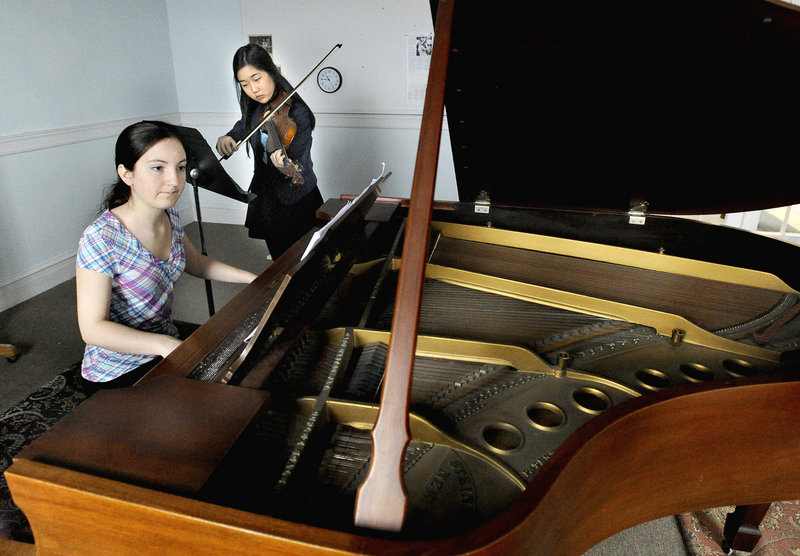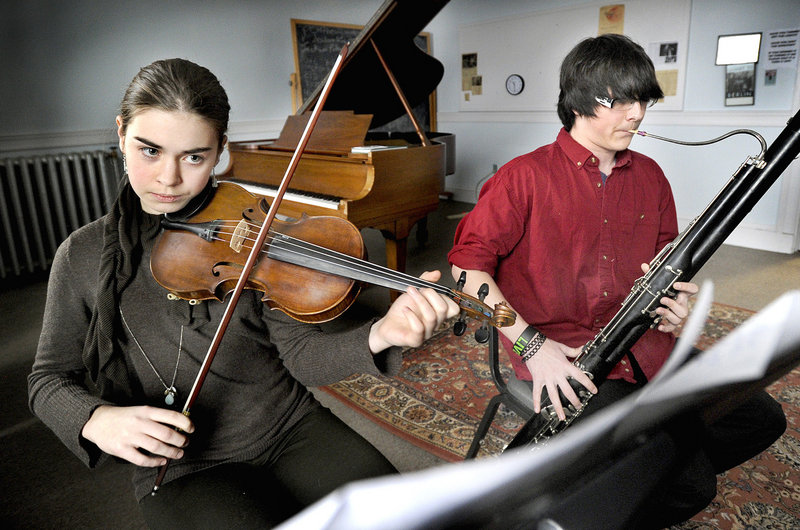Kelia Ingraham sits pensively at the piano bench, awaiting the arrival of her instructor. She is alone in the room but for the piano, the bench and a few empty chairs. Sheets of music fan out in front of her.
Along the hallway, the sounds of oboes, violins and other pianos seep from small rooms just like this one, where students just like Ingraham practice their music.
It’s 10 a.m. on Saturday morning, and there is no place Ingraham would rather be.
“They have a program like this in Boston, but that’s too far away to drive every weekend,” she says. “So I come here instead. I love it.”
“Here” is the Portland Conservatory of Music, housed on the upper floor of Woodfords Congregational Church in the Deering neighborhood of Portland.
Ingraham, a 17-year-old from Kennebunk, is among nine students participating in the conservatory’s inaugural Karger Scholars program. It targets high-achieving young musicians who otherwise might travel to Boston to receive the level of instruction this program offers.
Under new director Stephen Shiman, the conservatory began the program last fall. It’s the first tangible result of an institution-altering $300,000 gift from the estate of Trudi Karger, who taught piano at the school for many years and left money to the conservatory so others could share her love of music.
The goal, Shiman said, is to create a pre-professional music program with instructional depth that targets the very best young classical musicians within commuting distance of Portland. The program is open to Maine students, but they must commit to coming to Portland every Saturday morning for three hours of intense instruction.
The 20-week program teaches chamber music performance, music theory and composition.
“We want the students who have the capability to get into music as a career. We want them to get the training they need to go into the best college programs, such as the New England Conservatory or Juilliard. And we want to give them that opportunity right here in Portland,” Shiman said.
“The truth is, the most outstanding students in Maine go down to Boston for this. We’re trying to keep them here. There is such terrific talent in Maine, the idea of having something like this here is very exciting.”
It has started small. This year, there are nine students between the ages of 10 and 17. Because of the Karger gift, they were admitted with full scholarships after passing their auditions.
Chiharu Naruse, who helped develop the curriculum with Shiman and other music coaches, said the program would double in size next year, although it will offer scholarships to just nine students.
A SOCIAL EXPERIENCE, TOO
Ingraham is a model for the program. She has taken music lessons since she was 4, and began developing a passion for music at age 11.
“I didn’t really like it until I was 11,” she says. “But then everything started making sense. I got to the point where I could play easily, and I started to really enjoy it then.”
She has blossomed since. Her instructor encouraged her to apply for the Karger Scholars program.
Ingraham appreciates the focus on performance and theory. Learning how music works and in a chamber ensemble have helped sharpen her ability to interact musically with others, and also to understand the principles behind composition. Knowing how a song is constructed, and why, makes it easier to learn, she said.
The program is also socially satisfying.
“I am meeting musicians my age who I will stay friends with. And I am meeting lots of teachers and learning a lot,” said Ingraham, who intends to enter a university with a strong music program. She wants to study music performance, with an emphasis on chamber music.
Seoyeon Kim, a 13-year-old violinist and pianist from Falmouth, offered much the same assessment.
“It’s just really fun working in a chamber group, and this is the first opportunity I’ve had to study theory. It’s an amazing program with amazing teachers,” she said.
The best part?
“It’s free.”
Naruse said students benefit not only from small-group instruction and oftentimes individual coaching, but also from the opportunity to sit in a semi-circle with other students, look them in the eye and perform together. Playing in a small chamber group is not unlike athletes working together on a team, she said.
“They bring the best out of each other,” she said. “They can inspire each other, and push each others in a good way, to raise their performance standard.”
UNDERSTANDING MUSIC THEORY
For music coach Joshua DeScherer, the distinguishing component of the Karger Scholars program is its emphasis on music theory, which essentially is the study of how music works. Music theory teaches the language and notation of music. It is to music what grammar is to writing.
One cannot excel as a musician without understanding theory, just as a writer cannot write without understanding grammar, DeScherer said.
“Especially at this age, it’s important for these kids going forward to be educated musicians, and not just educated violinists or educated pianists or educated oboists,” he said. “Music theory allows you to play more than just the notes. There is nowhere else in Maine that offers music theory in this way.”
DeScherer commended the parents of these students for making the commitment to their education. When he was their age, DeScherer’s mother drove him and his upright bass every Saturday morning from their home in New Jersey into Manhattan for classes similar to this.
It changed his life, and set him on the course for a career in music.
He feels grateful for the opportunity to have an impact in the lives of these students, and to help them advance their music careers.
“The social aspect of getting these kids that have similar drive and similar aspirations together cannot be understated,” he said. “They’re all about the same age, and especially if they come from a rural area, they may not have many peers they can relate to. Making music is important, but making friends may be just as important.”
Thanks to Trudi Karger, these kids have the chance to do both.
Staff Writer Bob Keyes can be contacted at 791-6457 or:
bkeyes@pressherald.com
Twitter: pphkeyes
Send questions/comments to the editors.




